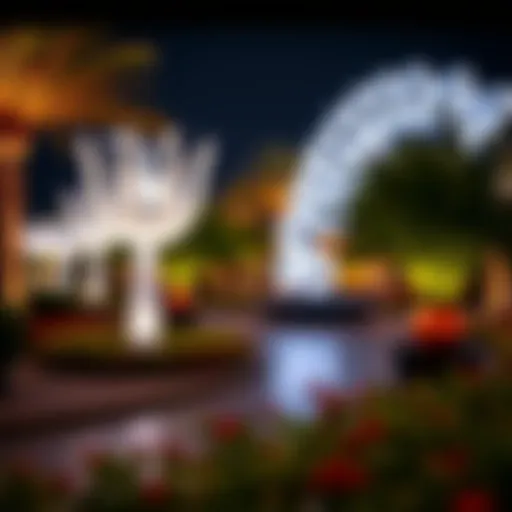Exploring Ramadan Holidays in the UAE: A Detailed Insight


Intro
Ramadan stands as a pivotal moment in the UAE, blending the threads of religious observance with the rich tapestry of cultural practices that shape daily life and business operations. Each year, the sighting of the moon marks the commencement of this holy month, inviting the community to embody values of empathy, reflection, and communal spirit. The significance of Ramadan transcends mere fasting; it influences the economy, social dynamics, and even the real estate market in noticeable and profound ways.
The Essence of Ramadan in the UAE
For many, Ramadan serves as a period of spiritual growth and heightened devotion. It's a time when families gather for iftar, breaking their fast with traditional meals and community celebrations. These gatherings reflect the UAE's deep-rooted values of hospitality and family connection. The essence of Ramadan extends beyond personal piety; it shapes every aspect of life, including business hours, work patterns, and social engagements.
During this month, the pace of life takes on a unique rhythm. Workdays might begin and end at unconventional hours, allowing for evening activities to flourish. This creates a distinctive environment for businesses, as they adapt to cater to both the demands of clientele and the festivities associated with Ramadan.
"In the UAE, Ramadan is not just a timing of fasting; it is a celebration of community and shared values, impacting both personal life and the broader economy."
This article will explore the multifaceted effects of Ramadan, particularly focusing on how it alters social dynamics and business operations. Furthermore, we will delve into the stimulating influence it has had on the real estate market, providing insights tailored for buyers, investors, and stakeholders in the UAE's housing sector.
Prolusion to Ramadan in the UAE
Ramadan in the United Arab Emirates (UAE) holds profound significance, binding together cultural, religious, and social aspects that shape the nation. As the holy month in the Islamic calendar, it serves as a time for introspection, community bonding, and charitable acts. The importance of understanding Ramadan in this context lies not just in its spiritual dimensions, but also in its multifaceted impact across society, economy, and daily life.
Historical Background of Ramadan
To grasp the essence of Ramadan in the UAE, one must first delve into its historical significance. Ramadan traces back over 1,400 years and is observed by Muslims as a month of fasting, prayer, Reflection, and community. According to tradition, the Quran was revealed to Prophet Muhammad during this month, marking it as a time of immense spiritual value.
In the UAE, the observance of Ramadan blends seamlessly with local customs and traditions that have evolved over centuries. The way cities, towns, and even communities engage with Ramadan reflects a tapestry interwoven with heritage and modernization. Families often share meals during iftar, the evening feast that breaks the fast, with dishes that tell a story—some rooted in Bedouin traditions, while others display influences from the diverse expatriate population.
The Islamic Calendar and Ramadan Timing
Understanding the scheduling of Ramadan requires a look into the Islamic calendar, a lunar-based system that is significantly different from the Gregorian calendar. Each month in the Islamic calendar is 29 or 30 days, determined by the sighting of the moon. Thus, Ramadan shifts approximately 11 days earlier each year, affecting the duration of daylight fasting as it cycles through the seasons.
As such, the starting date of Ramadan can vary from one place to another and must be announced by local religious authorities, adding an element of anticipation and community engagement. The initial day of Ramadan is often met with excitement and preparation, as Muslims across the UAE commence fasting from dawn until sunset, marking it as both a spiritual and communal experience.
The start of Ramadan is a moment of unity, as families and friends collectively embrace the practices that come with this holy month.
Through this lens, one can appreciate how Ramadan is not merely a time for personal spiritual journey but also a period in which the community engages in shared values, fostering closeness among individuals and families.
Cultural Significance of Ramadan
Ramadan holds a profound cultural significance in the UAE, deeply intertwined with the values and traditions that shape society. It's not just a timeframe marked by fasting; rather, it encapsulates a period of spiritual reflection, community bonding, and charitable giving. For many, the essence of Ramadan binds families and friends together, fostering a unique sense of belonging, all while reinforcing the moral compass of the community.
Fasting as a Spiritual Practice
Fasting during Ramadan is more than withholding food and drink; it's a holistic endeavor aimed at cultivating self-discipline and spiritual purification. The principle behind the fast is rooted in empathy—feeling the hunger experienced by the less fortunate fosters gratitude and compassion. This notion resonates strongly in the UAE, where diverse cultures intermingle, and individuals come together to share their experiences.
During Ramadan, many Muslims strive to deepen their connection with God. Ritual prayers increase, and the reading of the Quran often becomes a nightly activity. These practices intensify the spiritual atmosphere, providing a backdrop for personal growth.
“The month is a time for spiritual enlightenment and reflection—an opportunity to cleanse the soul and redirect focus towards what’s truly important.”
Additionally, the auspicious night of Laylat al-Qadr, believed to be the night when the Quran was revealed, falls within this holy month. It's marked by special prayers and supplications, adding to the reverence of this period. Therefore, fasting transcends mere abstention; it's about elevating one's spiritual state and embracing the ethos of generosity.
Social Responsibilities During Ramadan
The social fabric of UAE during Ramadan is rich with responsibility and camaraderie. The month is a time when social expectations shift, with a greater emphasis on charity and compassion. One of the vital aspects of Ramadan is Zakat, a form of almsgiving treated in Islam as a tax and a duty for those able to give. This practice encourages the affluent to support the underprivileged, thus reinforcing social cohesion.
Moreover, the act of breaking the fast, or Iftar, is often a communal affair. Families and friends gather to share meals, and many iftar events extend beyond the immediate circle, inviting neighbors and even strangers to join. This intermingling fosters connections across diverse community groups, breaking down barriers that might otherwise exist.
UAE's government also plays a crucial role in promoting social initiatives during this time. Various programs are launched to support those in need, ensuring that the spirit of giving flourishes. As a result, Ramadan encourages participation in charitable acts at community centers, mosques, and even local businesses, urging everyone to get involved.
Community Events and Gatherings
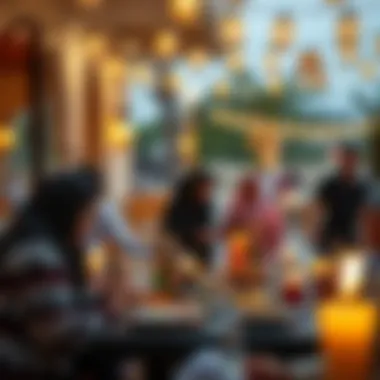
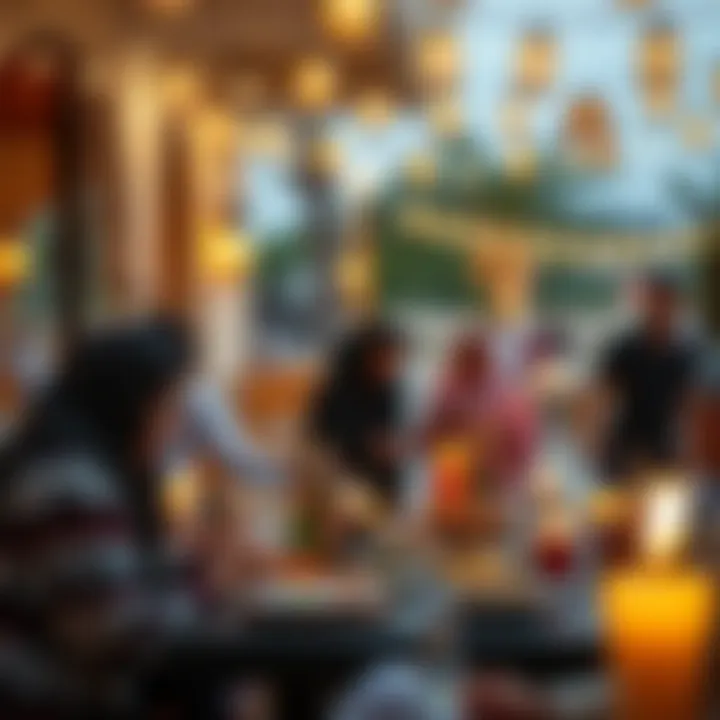
Ramadan in the UAE is noteworthy for its vibrant community gatherings. Cultural events flourish during this month, often organized to celebrate the spirit of togetherness. Public iftar tents can be found in various locations, providing free meals to those who wish to break their fast in good company. This communal experience not only nourishes physically but also holistically, fostering friendship and understanding amid diverse cultures.
In addition, many localities host cultural nights where residents can enjoy traditional food, art displays, and storytelling. These events are a treasure trove where old traditions meet modern expressions, allowing for cultural exchange and appreciation. Events like Ramadan markets pop up, presenting a variety of crafts, foods, and activities that celebrate local culture while welcoming visitors.
Through these gatherings, participants reflect the values of tolerance and acceptance that underpin the UAE's cultural identity. The month regularly ends with celebrations that strengthen community ties and create lasting memories. These practices are not just about marking a religious observance; they also showcase how Ramadan enriches communal life in the UAE, highlighting the importance of inclusivity and togetherness.
Public Holidays During Ramadan
Public holidays during Ramadan hold immense significance in the UAE, reflecting the cultural, spiritual, and social dynamics of the nation. These holidays provide a chance for the local community and expatriates alike to engage in shared practices, symbolizing unity and respect for the traditions that define this holy month. Timing these holidays correctly is not just about observance; it also impacts various sectors like retail, hospitality, and real estate. Over the years, the blend of tradition and modernity has enriched these holidays, making them cornerstones of social interaction and economic activities.
Understanding Official Ramadan Holidays
The UAE government typically announces public holidays during Ramadan, which often coincide with Eid al-Fitr, the festival celebrating the end of fasting. This is usually a three-day holiday, becoming a perfect opportunity for families to gather, celebrate, and reflect on the past month. Given the transient nature of the expatriate community, understanding the timing and structure of these holidays can help both residents and businesses navigate through this period more efficiently.
Employers are expected to be aware of the adjusted work hours that generally accompany Ramadan. Most organizations offer shorter working hours, allowing employees to manage their fasting and prayer routines. Furthermore, these changes often lead to increased productivity, as workers participate in the special atmosphere of Ramadan, focusing not only on work but also on their spiritual needs.
Eid al-Fitr Celebration
Eid al-Fitr marks the end of Ramadan and is celebrated with much fanfare across the UAE. This special holiday begins once the new moon is sighted, signaling the conclusion of the fasting period. It’s a time for families to exchange gifts, visit relatives, and attend communal prayers. Markets and restaurants often see a boom during this period, with people eager to try out special dishes prepared just for the occasion.
Key features of Eid al-Fitr include:
- Prayer Services: Early in the morning of Eid, Muslims gather in mosques and prayer grounds to perform special prayers. These are often well-attended, marking a significant aspect of community life.
- Charitable Giving: Zakat al-Fitr is a form of almsgiving, required of all Muslims to ensure that every individual can celebrate Eid. This aspect of charity underlines the principles of compassion and solidarity.
- Culinary Delights: Families often prepare traditional dishes and sweets, creating a festive atmosphere with flavorful dishes that are unique to the celebration.
The Eid holidays in the UAE are not just about family gatherings; they represent a time of increased activity in the economy. Retailers see a surge in sales as shoppers purchase gifts, clothing, and food. Hospitality sectors capitalize on the festive spirit, offering special promotions and packages, thus making Eid a powerful driver of economic growth in the region.
"The observance of Eid al-Fitr transcends mere ritual; it encompasses a sense of community and shared experience that resonates deeply with both locals and expatriates."
Understanding the structure and nuances of public holidays during Ramadan offers invaluable insight into how traditions shape the social fabric and socio-economic landscape of the UAE, paving the way for both cultural appreciation and business opportunities.
Economic Impact of Ramadan
The economic impact of Ramadan in the UAE is profound, influencing various sectors in surprising ways. This period is not only a major time for spiritual observance but also bursts with economic activities that can enhance the overall landscape of the region. Retail, hospitality, and even real estate sectors seek to adjust to the changing dynamics brought on by Ramadan. Understanding these elements is crucial for investors, homeowners, and businesses who wish to leverage the opportunities that arise during this month.
Retail and Hospitality Changes
During Ramadan, retail and hospitality sectors experience a notable shift. Shopping centers often extend their hours well into the evening, aligning with the Iftar meals. The buzz in malls becomes palpable. Special promotions and discounts flood the marketplace during this time, attracting customers keen on shopping before breaking their fast.
- Increased Sales: Retailers capitalize on increased foot traffic, leading to a spike in sales of food items and traditional Ramadan products such as dates and sweets. Families often stock up on these items as a part of their Iftar preparations.
- Hospitality Boost: Restaurants and cafes evolve their offerings, introducing Iftar and Suhoor menus that cater to both locals and tourists. Dining out becomes more prevalent as people choose to break their fast in communal settings, fostering social connections.
Observance of Ramadan in Dubai
Observing Ramadan in Dubai is not just a religious practice; it also encapsulates a rich tapestry of cultural activities and social interactions. This period is marked by increased spirituality, community engagements, and varying business protocols. For investors and homeowners, understanding these observances can provide insights into the real estate market dynamics and social opportunities that arise during this time.
Local Customs and Traditions
In Dubai, Ramadan showcases a unique blend of Islamic traditions and local customs. The sound of the adhan (call to prayer) resonates across the city, marking the beginning of each day of fasting. Families often come together, adorning homes with beautiful lights and decorations akin to festive ornaments. One notable custom is the Iftar, which is the meal to break the fast. It's common for people to host large gatherings, inviting friends and neighbors to share the meal. This practice not only promotes community spirit but also strengthens relationships within the multicultural landscape of Dubai.
Certain neighborhoods might set up large tents or outdoor spaces, where free meals are provided for those in need. This charitable element of Ramadan emphasizes unity and support among the community. In essence, these local customs highlight the importance of connection and generosity during the holy month in Dubai.
Dining Practices During Ramadan
Dining practices during Ramadan in Dubai are distinct, reflecting both the urgency of breaking fast and the joy of communal dining. The Iftar banquet is a significant event, often beginning with dates and water, both traditional and symbolic choices to break the fast. Restaurants and hotels gear up to offer Iftar buffets, showcasing an array of culinary delights that range from traditional dishes like harees and samboosas to international cuisine suited for various tastes.
As the sun sets, the streets come alive with the smell of food and animated conversations, as friends and families gather. To accommodate the influx of diners, many eateries extend their hours and offer special menus targeted for the occasion.
However, it’s important for businesses to consider the cultural sensitivities during this time. Some restaurants opt to close during daylight hours or provide limited services to respect those fasting.
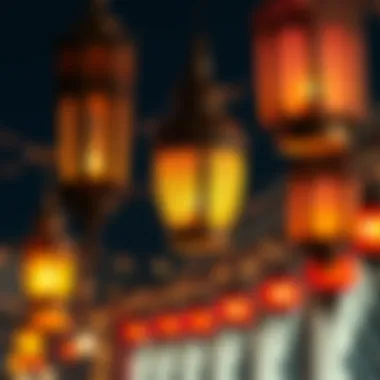

"Dining during Ramadan isn’t merely about enjoying food; it's an opportunity to bond, share stories, and create memories, enhancing community cohesion."
For investors and analysts, understanding these dining trends offers a wealth of information about consumer behavior, which can directly impact potential investment strategies in the hospitality sector.
In summary, the observance of Ramadan in Dubai is steeped in rich traditions and customs that not only reinforce social ties but also shape the economic landscape. For those interested in real estate and business, familiarizing oneself with these customs can spell the difference between absence and opportunity.
Impact on Real Estate Investment
Understanding the impact of Ramadan on real estate investment offers a unique lens through which to evaluate potential opportunities and challenges within the UAE’s dynamic property market. While the holy month of Ramadan is primarily a time for reflection and spiritual growth, it also sets off distinct economic shifts that keen investors should keep an eye on. The variance in consumer behavior, changes in working hours, and the environment of social togetherness all play significant roles in influencing real estate dynamics.
Opportunities for Investors
Ramadan is more than just a month of fasting; it's a season that can unveil noteworthy investment prospects. Many investors tend to overlook this period, thinking it might be a slow month for purchases or developments. However, the opposite is often true. Here are some particular opportunities to consider:
- Increased Demand for Rental Properties: Families often seek temporary accommodations and larger rental properties during this time, especially if they are hosting iftar gatherings and have guests. This can provide owners and landlords a chance to capitalize on the surge in demand.
- Discounted Prices: In many cases, sellers may be eager to close deals before Eid al-Fitr, resulting in competitive pricing and potential discounts. Buyers may find good deals as sellers may be motivated to finalize transactions.
- Project Launches Aligned with Ramadan: Real estate developers sometimes launch new projects during Ramadan, capitalizing on the marketing advantages provided by the community-oriented atmosphere. Investors can align their portfolios with emerging developments that resonate with the cultural significance of the season.
- Enhancing Community Engagement: Ramadan encourages developers to engage more with local communities through family-oriented public events and activities, providing an extended reach and visibility for new properties.
Fostering relationships during this time can lead to fruitful partnerships, beneficial for investors looking to expand their portfolios.
Market Trends During Ramadan
Each Ramadan can reshape market behavior and trends within the property sector. Understanding these shifts is crucial for anticipating how the market will perform both during and after the month of Ramadan. The following trends can provide insight into market movement:
- Short-term and Long-term Rentals Booming: There’s a noticeable uptick in short-term rentals, as expatriates and tourists may engage in travel plans to visit family or explore the UAE during Ramadan. This creates an opportunity for rental property stakeholders.
- Increased Activity in Retail Spaces: Ramadan sees a rise in foot traffic in retail areas in line with the shopping for Ramadan and Eid celebrations. Investors with interests in mixed-use developments can benefit from this pattern, as retail sectors often see growth during this time.
- Commercial Spaces Adjusting Timings: As working hours shift during Ramadan, businesses often adjust their timings. This can lead to a reevaluation of spaces needed, making it essential for property owners to be flexible and responsive to the seasonal needs of tenants.
"Understanding the unique rhythm of the real estate market during Ramadan can unlock avenues for elevated investment potential."
- Community Features Becoming More Important: The presence of community spaces, such as parks and communal areas, is gaining traction. As families come together to break their fast, environments that facilitate social gathering can increase property allure.
Investors who grasp these nuances during this distinct period stand to gain a significant edge in the UAE's competitive market. Engaging actively during Ramadan can yield profitable returns long after it concludes.
Legal Aspects of Ramadan Holidays
Navigating the landscape of Ramadan holidays in the UAE involves understanding complex legal frameworks that govern various aspects of life during this holy month. These laws are not there just as rules; they reflect the cultural and religious significance of Ramadan in Emirati society. By grasping the legal aspects, one can appreciate how they strengthen community bonds, boost economic activities, and maintain respect for cultural norms. This section provides essential insights into labor laws and business regulations that transpire during Ramadan, vital for investors, homeowners, and any professional operating in the UAE.
Labor Laws and Working Hours
During Ramadan, the UAE implements specific labor laws to ensure that both employees' rights and cultural values are upheld. The Federal Authority for Government Human Resources typically stipulates reduced working hours for staff during this month. Employees in the private sector often experience a decrease in their working hours to a maximum of six hours per day, allowing for better flexibility to accommodate fasting and religious observances.
Key Points Include:
- Employees can expect their salaries to remain consistent despite the reduction in working hours.
- Employers are prohibited from requiring fasting employees to engage in strenuous work that could pose health risks.
"The shortening of working hours during Ramadan respects the spiritual needs of employees while ensuring productivity is sustained across sectors."
Additionally, many firms offer flexibility in terms of leave or remote working options to accommodate employees who hold varying religious observances. It is essential for businesses and partners operating in the UAE to be aware of these regulations to foster an inclusive working atmosphere, cultivate goodwill among employees, and minimize legal risks.
Regulations for Businesses
The guidelines for businesses during Ramadan are largely focused on maintaining sensitivity and respect for the holy month while ensuring operational efficiency.
Considerations for Businesses:
- Operating Hours: Many establishments, especially in the hospitality and retail sectors, adjust their hours to accommodate the fasting schedule. For example, restaurants and cafes may open only after sunset, making iftar—a meal to break the fast—an essential time for increased business activity.
- Promotions and Deals: Businesses often tailor their marketing strategies to align with Ramadan sentiments, offering exclusive deals and promotions that appeal to community values.
- Signage and Advertising: It is crucial for businesses to refrain from any advertising that could be considered disrespectful during Ramadan. For example, displaying alcoholic beverages during this period could lead to legal repercussions.
By understanding these regulations, businesses enhance their chances of operating smoothly while also honoring the spirit of Ramadan. The potential benefits include strengthening customer loyalty and contributing positively to the UAE's diverse cultural tapestry.
Social Etiquette During Ramadan
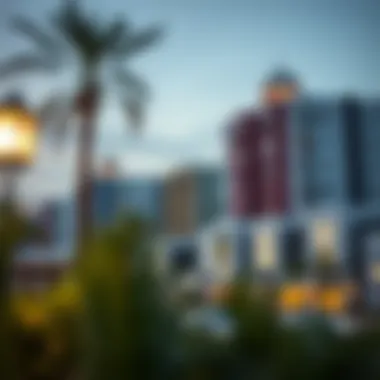
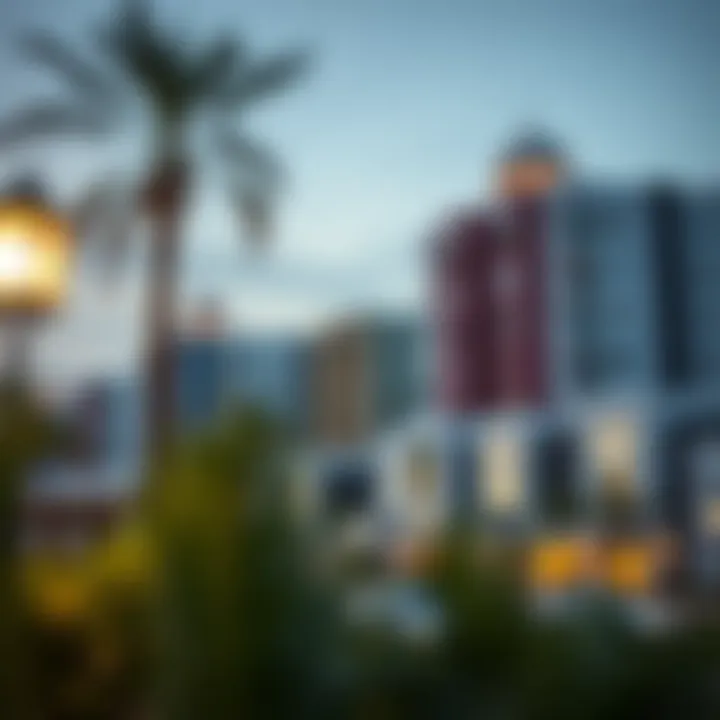
The observance of Ramadan in the UAE encompasses not only spiritual practices but also a necessary adherence to social etiquette. During this holy month, social behavior shifts significantly, reflecting respect for the cultural and religious values of the Emirati community. Understanding and following social etiquette during Ramadan fosters a sense of community and harmony, particularly for expatriates and new residents who may be unaware of local customs. Adhering to these customs is beneficial not only to oneself but also to the overall experience of Ramadan in the UAE.
Respecting Cultural Practices
Respecting cultural practices during Ramadan is paramount. From the initial days of fasting to the celebrations of Eid al-Fitr, the behaviors exhibited by individuals can either reinforce or undermine communal respect. For instance, one ought to refrain from eating, drinking, or smoking in public during daylight hours. Doing so shows a conscious acknowledgment of the fast that many in the community observe. Even non-Muslims are encouraged to practice this decorum as a sign of solidarity with their neighbors.
These cultural practices are rooted not just in religious observance; they symbolize respect for thousands of years of tradition. As the sun sets, the local customs transform. Families and friends gather for Iftar, the evening meal to break the fast, often sharing food with neighbors, reinforcing social bonds.
It's also crucial to remember to be sensitive in one’s discussion topics during Ramadan. Avoiding conversations around food or drinks can show maturity and understanding. Engaging with locals about how they celebrate and what Ramadan means to them can foster deeper connections.
Interacting with Local Communities
When interacting with local communities during Ramadan, one must be mindful and considerate. The breaking of fast, known as Iftar, often becomes a social occasion, and many Emiratis extend invitations to friends and neighbors to join in this meal. Accepting such invitations offers windows into local culture. However, it’s equally important to communicate your presence respectfully.
Non-Muslims should express gratitude for the invitation, emphasizing their interest in participating in local traditions without overstepping personal boundaries. There’s a fine line between being enthusiastic and unwittingly intrusive. Listening and observing are just as important as participating.
Moreover, additional etiquette extends to greetings. Wishing friends and colleagues "Ramadan Mubarak" or "Ramadan Kareem" is more than a casual greeting; it is a sincere recognition of the significance of this month.
Implementing these social etiquettes during Ramadan cultivates a stronger sense of community and mutual respect between locals and visitors. Respect for cultural practices and careful interaction shapes a more rewarding experience during one of the most sacred months in the UAE's cultural calendar.
"When respect and understanding meet, the spirit of Ramadan thrives, illuminating connections beyond the surface." - Unknown
By embracing these principles, individuals and communities alike can contribute positively to the ambiance of Ramadan in the UAE, enriching their cultural experience. For further insights and guidelines, visit Wikipedia Ramadan and Government of UAE.
Ramadan and Family Dynamics
Ramadan is not only a time of spiritual reflection but also a season that weaves families closer together. In the UAE, where traditions are held close to heart, the significance of familial bonds during this holy month takes on added weight. The nuances of Ramadan foster an environment for families to reconnect, share joy, and strengthen relationships through various activities and customs, all of which contribute tremendously to the overall community spirit.
Family Gatherings and Iftar
The breaking of the fast each evening, known as Iftar, becomes the cornerstone for family gatherings. As the sun dips below the horizon, families flock to one another’s homes, sharing meals that symbolize more than just food. These gatherings are rich with diverse culinary delights, from flavorful dates to fragrant biryanis, reflecting the UAE's multicultural tapestry.
During Ramadan, Iftar isn't just about nourishment; it serves as a celebration of unity and gratitude. Sharing a meal after a long day of fasting cultivates a deep sense of togetherness. Often, homes overflow with family members, friends, and even neighbors, amplifying the sense of belonging. No one is ever left alone during Iftar. Importantly, the act of breaking bread together fuels conversation and storytelling, which strengthens intergenerational bonds within the family.
The atmosphere can be almost magical, with children darting in and out as the aroma of delicious dishes fills the air. Family recipes are often passed down during this time, and there's immense pride in preparing a cherished dish that has been part of a family's history for years.
Children's Role in Ramadan
Children play a pivotal role during Ramadan, acting as enthusiastic participants in the rituals and festivities that surround the month. Their engagement is not merely passive; instead, it's vibrant and filled with curiosity. Many families introduce the concept of fasting to older kids gradually, allowing them to experience the spiritual growth that fasting promotes. It’s a rite of passage that helps them embrace empathy, learning to appreciate the privileges they have, which many around the world may not.
During Iftar, children often assist in preparing the meals and setting the table. Their involvement is a great opportunity for parents to educate them about the importance of caring for others.
"Celebrating Ramadan is not just about abstaining from food but instilling values of compassion and generosity in our younger generation."
Additionally, children are also encouraged to participate in community service, from distributing food to those in need to contributing to charity. These activities not only instill a sense of responsibility but also teach them the value of community support. The joy on a child's face when they help someone in need during Ramadan can be profoundly rewarding for the entire family.
In summary, Ramadan acts as a powerful force in shaping family dynamics across the UAE. The month’s communal aspects, with its focus on Iftar and the active participation of children, not only enrich family ties but also ensure that the values of generosity, gratitude, and community are passed down through generations.
The End
As we reach the closing chapter of this exploration into Ramadan holidays in the UAE, it's vital to reflect on the profound implications wrapped within this cultural observance. Ramadan, much more than a mere period of fasting, serves as a pivotal time for social connection, economic shifts, and family unity. This intricate tapestry unfolds layers of tradition interwoven with contemporary practices that are indispensable to understanding the UAE's cultural ethos.
Reflecting on Ramadan's Impact
The significance of Ramadan transcends the boundaries of personal faith. It impacts various sectors and individuals, providing key insights for investors, homeowners, and anyone engaged with the UAE's economic landscape. Not just a spiritual retreat, Ramadan fosters a collective sense of empathy among the populace. During this month, businesses tend to recalibrate their strategies, catering to the changing demands of consumers while respecting cultural sensibilities.
Ramadan is a time when the socio-economic pulse of the UAE quickens, urging stakeholders to adapt and innovate.
One can't help but notice a marked transformation in community interaction during this period. Events like iftars—where families and friends gather to break their fast—highlight the importance of relationships. Real estate investors and agents should acknowledge this when considering market dynamics; properties located near mosques or community centers often see increased interest during Ramadan.
Additionally, the alteration in working hours and schedules brings an opportunity for businesses to reassess their operations. The adaptation to shorter working hours establishes an environment where employers are encouraged to engage more deeply with their staffs' wellbeing, ultimately leading to productivity gains and elevated moral.
Finally, the family dynamics that emerge during Ramadan reflect a broader societal connection. Families come together, fostering bonds that create stability and shared experiences, which can influence the community at large. For investors, engaging with these family-oriented values can be a strategic component in marketing homes or services.





